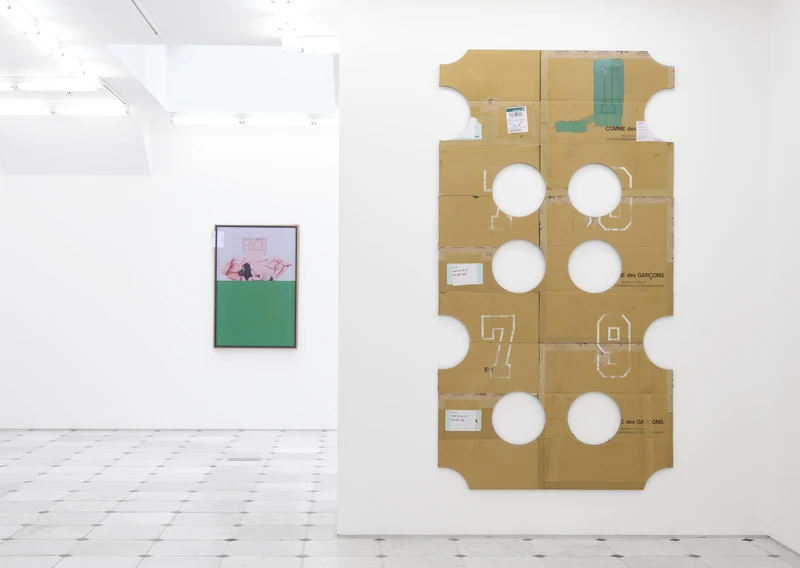Nick Relph: Fils, ta vision!
13 Sep-4 Nov 2023
PV 12 Sep 2023, 6-8pm


Herald St is pleased to announce Fils, ta vision!, an exhibition of new work by Nick Relph. The presentation features three bodies of work which employ cardboard boxes as a structural and conceptual base. Fils, ta vision! continues the artist’s investigations into his urban surroundings, using the city as an archive and archaeological site to ingrain and emanate in his output. Repeatedly mining his own practice as well as contemporary and historical subculture, the pieces are layered with patterns and processes at once idiosyncratic and universal.
The bulk of the exhibition consists of works constructed from discarded Comme des Garçons packaging, which Relph has collected over the past four years from sidewalks in New York. His obsessive and prolific accumulation of the boxes mirrors the cult fandom of the brand by the creative literati and glitterati, including the artist himself. He presents them flattened and crisply punched with geometric patterns, mostly based on a fractal of exponentially repeating right-left-left-right circles, squares, and ellipses. The even sequence meets odd digits, silkscreened onto the face of the pieces; these numbers are taken from templates for football shirts which the artist acquired from a defunct print shop. The choice of figures stems from a 2013 interview between Rei Kawakubo and Hans Ulrich Obrist for System magazine, in which Relph contributed some questions, including, ‘Do numbers affect you?’, to which the designer expressed her strong preference for odd numbers, claiming, ‘You never see anything in pairs’. The boxes have been finished with mica powder, resulting in a subtle iridescence. Continuing ‘in the spirit of getting shit for free,’ Relph scoured the boulders of Central Park for traces of mica, scraping its scintillant flakes to eventually dust onto his pieces. He cites ukiyo-e woodblock prints as a precursor in using the mineral, and furthers the intertwining layers of image-making by presenting two works composed of branded packaging for another Japanese corporation, Epson. The title of the exhibition is taken from a dissected fragment of the logo on the boxes: ‘SON / YOUR VISION’, Frenchified à la Comme des Garçons. As with the Comme cardboard, the printer cartons have been perforated with circles, interrupting their structural integrity.
Fils, ta vision! is anchored by two pieces, which at initial glance appear to be from a 2014 series by the artist based on corrupted photographs from Hiroshi Fujiwara and Jun Takahashi’s Seditionaries Collection Book (2005). This publication represents a trove of punk culture, carefully documenting articles of clothing from the legendary label by Vivienne Westwood and Malcolm McLaren founded in the 1970s. Using a makeshift book scanner, Relph recorded page after page of this subcultural bible, storing the files in a hard drive which was knocked off a shelf, imbuing the images with ‘vomitous-looking’ bands of green, pink, and yellow. In this recent body of work he adds yet another strata of intervention, by UV-printing his pieces, frame and all, onto the packages which stored and shipped them. As Relph describes the enmeshed journey of processes, ‘First there’s a pair of boobs, which was made into a silkscreen, printed onto a shirt, and then made its way into Takahashi’s collection – he photographed it beautifully for his book, I scanned it terribly, that file was corrupted, I printed it using an Epson printer, and now it’s scanned back in all that time later.’
Being surrounded by cardboard boxes is a distinctly metropolitan experience, redolent of dislocation and cramped apartment floorspaces. In his exhibition, Relph evokes this urban phenomenon and looks even beyond the tools and machinery of image production to the packages that they are transported in. In the process, he exposes a number of ‘queasy overlays’: the collegiate typography of the numbers against a cliquey brand, discarded and disvalued items adorned with aspirational logos, corporate behemoths against an artistic practice. Embracing moments of discomfort and mystical alignments, the works in Fils, ta vision! are as platy and stratified as the mica dusted upon them.
Text by Émilie Streiff